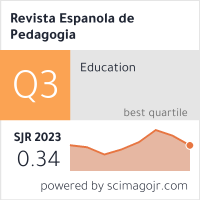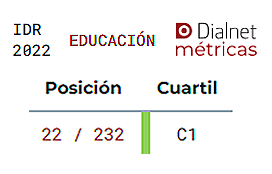Prácticum mediado por fotoelicitación: aportación a la formación inicial docente y a la permanente del profesorado-tutor
DOI
10.22550/2174-0909.4251
Abstract
This article investigates to what extent teaching degree students, during the three months of traineeship in schools, converse about, reflect on and rethink their tutors’ teaching practices through photo-elicitation processes to find professional development and improvement in both groups. A qualitative research methodology was used, focusing on the study of two cases. A photo-elicitation approach was implemented, guided by the trainee teachers to enable them to reflect on their tutors’ practice in the classroom and school, through photography. The results indicate that the educational situations captured by the student teachers are of an instructional and formative nature, with a predominance of denotative and connotative levels in the content of the first group and of denotative, connotative and affective levels in the second group. The photo-elicitation process followed led to the development of three main types of relationship between the trainee teachers and their tutors, defined as confirmation, contribution and reference, which fostered complicity, involvement, joint responsibility and mutual professional development.
Referencias | References
Allen, J., Singh, P., & Rowan, L. (2019). Professional experience in initial teacher education: Keeping abreast of change in the 21st century. Asia-Pacific Journal of Teacher Education, 47(4), 323-326. https://doi.org/10.1080/1359866X.2019.1637599
Barthes, R. (1989). La cámara lúcida [Camera lucida]. Paidós.
Bautista, A. (2013, April 3). Instruir, pero también formar [To instruct, but also to train]. El País. https://elpais.com/elpais/2013/04/03/opinion/1364997141_478189.html
Bautista, A. (Ed.). (2023). Photographic elicitation and narration in teachers’ education and development. Springer.
Betlem, E., Clary, D., & Jones, M. (2019). Mentoring the mentor: Professional development through a school-university partnership. Asia-Pacific Journal of Teacher Education, 47(4), 327-346. https://doi.org/10.1080/1359866X.2018.1504280
Birkeland, A., & Grindheim, L. T. (2022). Photo-elicitation interviews - A possibility for collaborative provocation of preconceptions. Video Journal of Education and Pedagogy, 37(4), 1-12. https://doi.org/10.1163/23644583-bja10026
Burroughs, G., Lewis, A., Battey, D., Curran, M., Hyland, N. E., & Ryan, S. (2020). From mediated fieldwork to co-constructed partnerships: A framework for guiding and reflecting on P-12 school-university partnerships. Journal of Teacher Education, 71(1), 122-134. https://doi.org/10.1177/0022487119858992
Colén, M, T., & Castro, L. (2017). El desarrollo de la relación teoría y práctica en el Grado de Maestro en Educación Primaria [The development of theory and practice relationship in Primary Education Degree]. Profesorado. Revista de currículum y formación de profesorado, 21, 59-79. https://recyt.fecyt.es/index.php/profesorado/article/view/58048
Collier, J. (1954). Photography in anthropology: A report on two experiments. American Anthropologist, 59(5), 843-859.
Darling-Hammond, L. (2017). Teacher education around the world: What can we learn from international practice? European Journal of Teacher Education, 40(3), 291-309. https://doi.org/10.1080/02619768.2017.1315399
Darling-Hammond, L. (2020). Accountability in teacher education. Action in Teacher Education, 42, 60-71. https://doi.org/10.1080/01626620.2019.1704464
Dockett, S., Einarsdottir, J., & Perry, B. (2017). Photo elicitation: Reflecting on multiple sites of meaning. International Journal of Early Years Education, 25(3), 225-240. https://doi.org/10.1080/09669760.2017.1329713
Falcón, C., & Arraiz, A. (2020). Construcción de la identidad profesional docente durante la formación inicial como maestros [Construction of teaching professional identity during initial training as teachers]. Revista Complutense de Educación, 31(3), 329-340. https://doi.org/10.5209/rced.63374
Flores, M. A. (2019). Learning to be teacher: Mentoring, collaboration and professional practice. European Journal of Teacher Education, 42(5), 535-538. https://doi.org/10.1080/02619768.2019.1680207
Foong, L., Md Nor, M. A., & Nolan, A. (2018). Individual and collective reflection: Deepening early childhood pre-service teacher’s reflective thinking during practicum. Australasian Journal of Early Childhood, 43(1), 43-51. https://doi.org/10.23965/AJEC.43.1.05
Gibbs, G. R. (2012). El análisis de datos cualitativos en investigación educativa [Analyzing qualitative data]. Morata.
Golombek, P. R., & Johnson, K. E. (2017). Re-conceptualizing teachers’ narrative inquiry as professional development. PROFILE: Issues in Teachers’ Professional Development, 19(2), 15-28. http://dx.doi.org/10.15446/profile.v19n2.65692
Häggström, M. (2022). Teacher education: Student teachers’ ethics-related experiences from their placements in Uganda. European Journal of Teacher Education, 47(3), 599-614. https://doi.org/10.1080/02619768.2022.2109460
Harper, D. (2002). Talking about pictures: A case for photo elicitation. Visual Studies, 17(1), 13-16. https://doi.org/10.1080/14725860220137345
Heron, J., & Reason, P. (1997). A participatory inquiry paradigm. Qualitative Inquiry, 3(3), 274- 294.
Jones, L., Tones, S., Foulkes, G., & Jones. R.C. (2021). Associate teacher’s view on dialogic mentoring. Teachers and Teaching, 27(1-4), 181-192. https://doi.org/10.1080/13540602.2021. 1933421
Korthagen, F. (2017) Inconvenient truths about teacher learning: Towards professional development 3.0. Teachers and Teaching, 23(4), 387-405. https://doi.org/10.1080/13540602.2016.1211523
Lee, J. (2024). Teachers in the field: Using photovoice to study teaching behavior. International Journal of Advanced Culture Technology, 12(3), 88-105. https://doi.org/10.17703/IJACT.2024.12.3.88
Mannay, D. (2017). Métodos visuales, narrativos y creativos en investigación cualitativa [Visual, narrative and creative research methods. Application, reflection and ethics]. Narcea.
Mauri, T., Onrubia, J., Colomina, R., & Clará, M. (2019). Sharing initial teacher education between school and university: Participants’ perceptions of their roles and learning. Teachers and Teaching, 25(4), 469-485.
Mauri, T., Onrubia, J., & Colomina, R. (Eds.). (2021). Mejorar las prácticas de maestro: pautas e instrumentos [Improving teacher practices: Guidelines and tools]. Grijalbo
McCardle, T., Schroeder, S., & Korson, S. (2022). “Education is political now”: Pre-service teacher socialization in politically charged times. Educational Studies, 58(2), 225-249. https://doi.org/10.1080/00131946.2022.2051028
McLaughlan, T. (2023). International undergraduates’ perceptions of social engagement in online and face to face learning environments: A photo-elicitation approach to thematic analysis. Smart Learning Environments, 10, 11. https://doi.org/10.1186/s40561-023-00230-4
Monforte-García, E., & Edo-Agustín, E. (2024). El Prácticum como eje para la inclusión: un estudio de caso desde la mirada del alumnado con fotoelicitación [The Practicum as an axis for inclusion: A case study from the students’ point of view with photo-elicitation]. Revista Prácticum, 9(2), 11-23. https://doi.org/10.24310/rep.9.2.2024.20076
Ndione, L. C., & Remy, E. (2018). Combining images and words in order to understand the cultural meaning of practices: What photo-elicitation reveals. Recherche et Applications in Marketing, 33(3), 61-84. https://doi.org/10.1177/2051570718782450
Pirker, A., Hafenscher, J., & Lindner, T. (2023). Investigating the self-perception of social, emotional and academic inclusion of students with and without special education needs through photovoice. Education Sciences, 13(4), 423. https://doi.org/10.3390/educsci13040423
Rachamim, M., & Orland-Barak, L. (2018). When the style meets the pattern in the mentoring talk: Implications for the learning environments of the student and teacher community in practical teaching. Cambridge Journal of Education, 48(5), 657-675. https://doi.org/10.1080/0305764X.2017.1401587
Rapley, T. (2014). Los análisis de conversación, de discurso y de documentos en investigación cualitativa [Doing conversation, discourse and document analysis]. Morata.
Raven, N. (2015). New perspectives using participatory photography to evaluate widening participation interventions. Research in Post-Compulsory Education, 20(4), 470-475. https://doi.org/10.1080/13596748.2015.1081750
Rayón, L., Romera, M. J., De las Heras, A., Torrego, A. y Bautista, A. (2021). Foto-elicitación e indagación narrativa visual en estudio de casos y grupos de discusión [Photo-elicitation and visual narrative enquiry in case studies and focus groups]. New Trends in Qualitative Research, 5, 41-56. https://doi.org/10.36367/ntqr.5.2021.41-56
Rezvani, H. S. (2024). Differentiated instruction for English learners: Teachers’ understanding and practices. TESOL Journal, 15(4), e817. https://doi.org/10.1002/tesj.817
Richard, V. M., & Lahman, M. K. (2015). Photo-elicitation: Reflexivity on method, analysis, and graphic portraits. International Journal of Research y Method in Education, 38(1), 3-22. https://doi.org/10.1080/1743727X.2013.843073
Rose, G. (2001). Visual methodologies: An introduction to researching with visual materials. Sage.
Ruto-Korir, R., & Lubbe-De Beer, C. (2012). The potential for using visual elicitation in understanding preschool teachers’ beliefs of appropriate educational practices. South African Journal of Education, 32(4), 393-405. https://doi.org/10.15700/saje.v32n4a661
Savva, A., & Erakleous, V. (2018). Play-based art activities in early years: Teachers’ thinking and practice. International Journal of Early Years Education, 26(1), 56-74. https://doi.org/10.1080/09669760.2017.1372272
Schön, D. A. (2016). Educating the reflective practitioner (6th ed.). Jossey-Bass.
Sinclair, C., & Thornton, L. J. (2018). Exploring preservice teachers’ conceptions after ‘living a hybrid curriculum’. European Physical Education Review, 24(2), 133-151. https://doi.org/10.1177/1356336X16669331
Stake, R. E. (2020). Investigación con estudio de casos [The art of case study research] (R. Filella, Trad.) (6.ª ed.). Morata.
Stockall, N., & Davis, S. (2011). Uncovering pre-service teacher beliefs about young children: A
photographic elicitation methodology. Issues in Educational Research, 21(2), 192-209.
Torre, D., & Murphy, J. (2015). A different lens: Changing perspectives using photo-elicitation interviews. Archivos Analíticos de Políticas Educativas, 23, 111. https://doi.org/10.14507/epaa.v23.2051
Walker, A., Langdon, J. L., Colquitt, G., & McCollum, S. (2017). Using photovoice to initiate improvement in a PETE program. Journal of Teaching in Physical Education, 36(1), 83-96. https://doi.org/10.1123/jtpe.2015-0092
Walls, J., & Louis, K. S. (2023). The politics of belonging and implications for school organization: Autophotographic perspectives on “fitting in” at school. AERA Open, 9. https://doi.org/10.1177/23328584221139766
Weng, Z., & Troyan, F. J. (2023). Developing language teacher identity through photo-elicitation in TESOL teacher education. Tesol Journal, 14(3), e714. https://doi.org/10.1002/tesj.714
White, S., & Forgasz, R. (2016). The practicum: The place of experience? In J. Loughran, & M. L. Hamilton (Eds.), International handbook of teacher education (pp. 231-266). Springer.
Woolhouse, C. (2019). Conducting photo methodologies with children: Framing ethical concerns relating to representation, voice and data analysis when exploring educational inclusion with children. International Journal of Research y Method in Education, 42(1), 3-18. https://doi.org/10.1080/1743727x.2017.1369511
Citación recomendada | Recommended citation
Bautista-García-Vera, A., Romera-Iruela, M. J., Limón-Mendizábal, M. R., & Uxach-Molina, B. (2025). Practicum mediated by photo-elicitation: Contribution to initial teacher training and the professional development of the teacher-tutor [Prácticum mediado por fotoelicitación: aportación a la formación inicial docente y a la permanente del profesorado-tutor]. Revista Española de Pedagogía, 83(291), 347-362. https://doi.org/10.22550/2174-0909.4251
Licencia Creative Commons | Creative Commons License
Esta obra está bajo una licencia internacional Creative Commons Atribución-NoComercial 4.0.
This work is licensed under a Creative Commons Attribution-NonCommercial 4.0 International License
Included in
Palabras clave | Keywords
Teacher education, professional development, practicum, teacher tutoring, participatory reflection, photo-elicitation.








